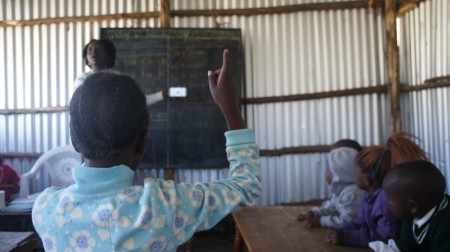
A child takes part in Peek school eye health screening in Nakuru, Kenya.
Credit: Peek Vision
The Peek school eye health system has more than doubled the proportion of children attending follow-up appointments in a trial comparing it to conventional eye health screening, according to new research published in The Lancet Global Health.
The study, led by the International Centre for Eye Health at the London School of Hygiene & Tropical Medicine, was carried out in a partnership with the Kenyan Ministry of Health among more than 20,000 children in 50 schools in Trans Nzoia County, Kenya.
The Peek school eye health system is an integrated smartphone screening system which includes the Peek Acuity vision check app, a simulation tool showing a visual comparison of the child’s sight to clear vision (which can be printed on a postcard for parents and carers to remind them that their child needs treatment), and text message reminders to parents in the local language.
Childhood visual impairment is a major public health concern affecting 19 million children worldwide. Effective screening is required to enable early diagnosis and treatment and help prevent negative effects on children’s education and social interactions.
In this trial, participating schools were randomly allocated to receive either Peek school eye health or standard screening using conventional paper eye charts. If the vision check identified a visual impairment, the child was shown their simulated sight on the smartphone and given a print-out of this image with details of their appointment to take home to their parent or carer, who also received text message reminders about their appointment. In the standard group, schoolchildren referred after the standard paper-based vision test received a written hospital referral letter. In both arms of the trial, specially-trained teachers carried out the screening.
More than half (54%, 285 out of 531) of the Peek school eye health recipients who were referred for follow-up attended the appointment compared with 22% (82 out of 366) of those in the standard arm of the trial.
Lead author Dr Hillary Rono, an ophthalmologist and PhD candidate at LSHTM, said: “I live and work in an area of Kenya where specialist eye health workers are few and far between. It’s vital that we can use the resources we have as efficiently as possible, which is where the idea for school eye health screening came from – instead of sending highly qualified ophthalmic nurses to schools, what if the schools could accurately identify which children need further examination?
“We initially trained teachers to carry out vision screening in schools using standard paper testing cards but we found that very few children who were identified as needing to be referred actually went to their hospital appointments.
“This could be down to many things such as information not being passed on to parents, inaccessibility of services, costs, myths and fear. But the result is that many young people don’t receive treatment or a pair of glasses which would allow them to see properly – something which could transform their lives, education and career prospects.
“In this study – which is the first of its kind – we found that the Peek school eye health system substantially increased the proportion of children who attended their hospital appointment. Today, more than 80% of people in Kenya own a mobile phone – more than have access to clean water – so it makes sense to use this technology to improve the efficiency of our health care system.”
The school eye health programme in Kenya has since expanded to cover the entire Trans Nzoia region and will have screened 200,000 children by the end of 2018. The goal is now to expand the programme into other regions of Kenya in partnership with the Ministries of Health and Education.
Dr Andrew Bastawrous, Peek CEO and a co-author of the study, said: “Peek has used the findings from this trial to further refine and improve its eye health screening systems. Importantly, it has led to adoption, replication and expansion so that more people can be screened efficiently and accurately.
“The triage system recommended in this study has been developed for an updated Peek system which is being used for nationwide screening in Botswana, so the impact of the research is clear.”
The trial was funded by The Queen Elizabeth Diamond Jubilee Trust, Seeing is Believing, Operation Eyesight Universal and Wellcome Trust.
Publication
Hillary Rono, Andrew Bastawrous, David Macleod, Emmanuel Wanjala, GianLuca DiTanna, Helen Weiss, Matthew Burton. Smartphone-based visual impairment screening in Kenyan school children: a cluster randomised trial. The Lancet Global Health.